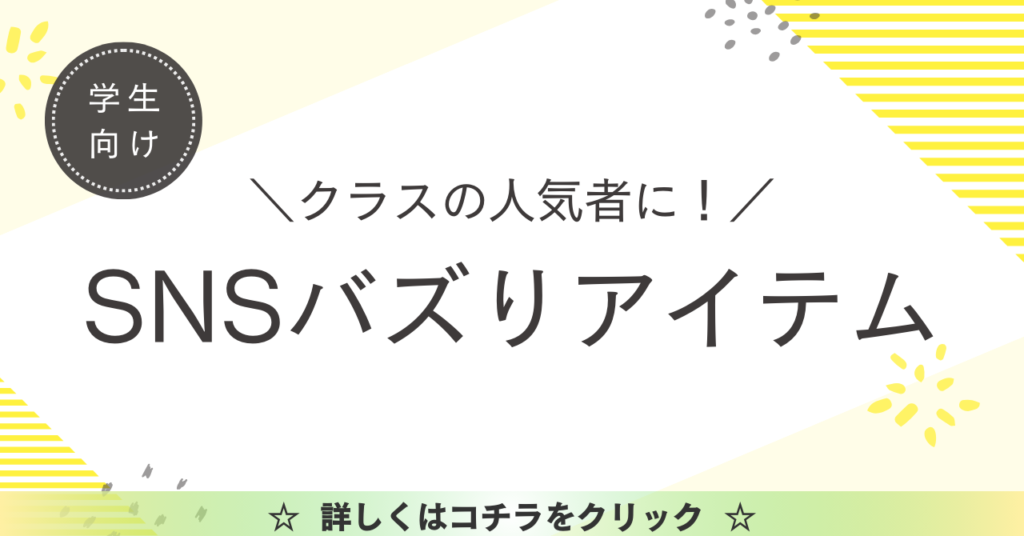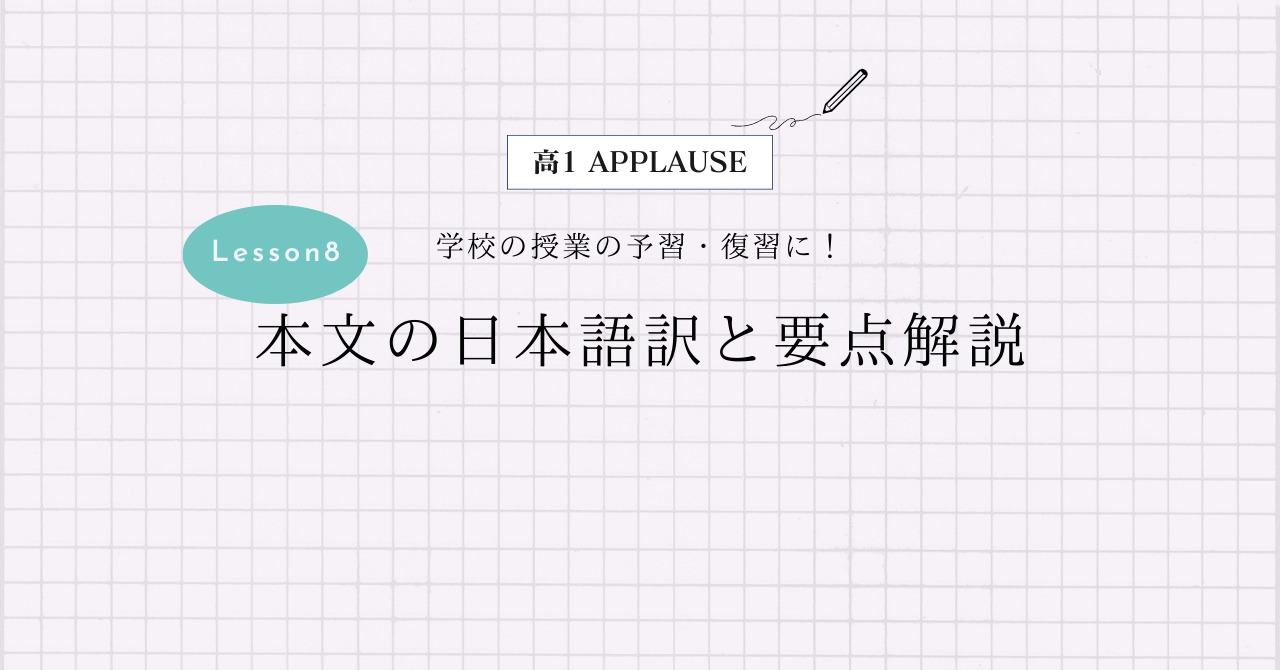開隆堂 高1APPLAUSE Lesson10 Section1の本文の日本語訳と重要箇所の解説です。
Lesson10-2, 10-3, 10-4の解説はこちらからご覧ください。
>高1APPLAUSE Lesson10 Section2 本文和訳
>高1APPLAUSE Lesson10 Section3 本文和訳
>高1APPLAUSE Lesson10 Section4 本文和訳
- APPLAUSE Lesson10 Section1 本文と日本語訳
- APPLAUSE Lesson10 Section1 重要事項の解説
- About 60% of the human body consists of water.
- When about 2% of water in the body is lost, it is said that we feel thirsty and the exercise capacity gets low.
- And, when more than 20% is lost, our life is in danger.
- Water is one of the essential things for us.
- We need to take clean water into our bodies constantly by drinking water or eating meals.
- We think that it is something natural.
- But in developing countries, many people can’t obtain clean water in times of drought.
- They drink dirty water from rivers or ponds, and their health is sometimes damaged.
- What they need now is clean water to drink.
- APPLAUSE Lesson10 Section1 まとめ
APPLAUSE Lesson10 Section1 本文と日本語訳
About 60% of the human body consists of water.
「人間の体の約60%は水から成ります。」
When about 2% of water in the body is lost, it is said that we feel thirsty and the exercise capacity gets low.
「体の水の約2%が失われると、私たちは喉が渇き、運動能力が低下すると言われています。」
And, when more than 20% is lost, our life is in danger.
「そして、20%以上が失われると、私たちの命が危うくなります。」
Water is one of the essential things for us.
「水は私たちにとって必要不可欠なものの1つです。」
We need to take clean water into our bodies constantly by drinking water or eating meals.
「私たちは水を飲んだり、食事をすることによって、常にきれいな水を体内に取り入れる必要があります。」
We think that it is something natural.
「私たちはそれを自然なことだと思っています。」
But in developing countries, many people can’t obtain clean water in times of drought.
「しかし発展途上国では、多くの人が干ばつ時にはきれいな水を手に入れることができません。」
They drink dirty water from rivers or ponds, and their health is sometimes damaged.
「彼らは川や池の汚い水を飲み、時には体を壊します。」
What they need now is clean water to drink.
「彼らが今必要としているものはきれいな飲み水です。」

APPLAUSE Lesson10 Section1 重要事項の解説
About 60% of the human body consists of water.
“about”は「約、およそ」といった副詞、“human”は「人間」、“body”は「体」という名詞です。
“consist of~”は「~から成る」という意味になります。
“of”は前置詞で,”A of B”の形で「BのA」というように後ろから前に訳します。
When about 2% of water in the body is lost, it is said that we feel thirsty and the exercise capacity gets low.
この文では「接続詞when」が使われていますね。
“lost”は“lose(を失う)”の過去分詞形で、ここでは「受動態」になっています。
“it is said that~”は「~と言われている」という表現で、“it”は形式主語で、真の主語は”that”以下の内容になります。
“feel”は「感じる」という動詞、“thirsty”は「喉が渇いた」、“low”は「下がった、低い、弱った」という形容詞、“exercise”は「運動」、“capacity”は「能力」という名詞です。
“get 形容詞”で「~になる」という重要表現となります。
And, when more than 20% is lost, our life is in danger.
この文でも「接続詞when」が使われていますね。
“more than~”は「~より多くの」という意味です。“over”も同じ意味があります。
ただし,人口や年月など元の数が大きい場合,つまりその数を含んでいるかが問題でない場合は「~以上」と訳してもOKです。
“life”は「命、生活、人生」という名詞で、“be in danger”は「危険な状態にある」といった意味になります。
Water is one of the essential things for us.
“one of 名詞の複数形”は「名詞のうちの1つ」という表現です。
“essential”は「必要不可欠な、必須の」という形容詞、“thing”は「もの、こと」という名詞ですね。
We need to take clean water into our bodies constantly by drinking water or eating meals.
“need”は「を必要とする」という動詞で、“to take”は「不定詞の名詞的用法」ですね。
“take A into B”は「AをBに取り入れる」という表現で、“clean”は「きれいな」という形容詞、“constantly”は「常に、絶えず」といった副詞になります。
“by”は「~によって」という前置詞で、前置詞なので後ろには名詞表現である「動名詞」が続いていますね。
“meal”は「食事」という名詞です。
“by”はほかにも色々な意味があるので、以下に簡単にまとめておきます。
1.受動態とセットで「~によって」
2.”by+乗り物”で「交通手段」
3.「~までに」という期限
4.「~のそばに」という場所を表す
We think that it is something natural.
この文では「接続詞that」が使われています。
“it”は直前の文全体を指しています。
“natural”は「自然な」という形容詞です。
“something”は「何か」という代名詞で,“-thing”の形の代名詞を形容詞で修飾するときは必ず後ろから修飾します。
“natural something”としないように要注意です!
But in developing countries, many people can’t obtain clean water in times of drought.
“develop”は「発展する」という動詞で、ここでは「現在分詞」として“countries”を修飾しています。
「発展している国」となるので、つまり「発展途上国」という意味になります。
ちなみに「先進国」は「発展した国」なので、“developed countries”と表現しますよ。
“obtain”は「を手に入れる」という動詞で、“drought”は「干ばつ」という名詞です。
“in times of~”は「~の時に」という表現ですね。
They drink dirty water from rivers or ponds, and their health is sometimes damaged.
“They”は“many people”を指しています。
“dirty”は「汚い」という形容詞、“pond”は「池」、“health”は「健康」という名詞ですね。
“sometimes”は「時々」という副詞で、“damage”は「にダメージ(被害)を与える」という動詞です。
ここでは「受動態」になっていて、直訳すると「彼らの健康は時にダメージを与えられる」となりますが、今回は「体を壊す」と意訳しました。
What they need now is clean water to drink.
“they”は“many people”を指しています。
“what”は「関係代名詞」で、1語で“the thing(s) which~”と同じ「~なもの・こと」という意味になります。
そのため書き換えると、“The thing which they need now is~”となり、つまり「彼らが今必要としているものは~」となりますね。
“to drink”は「不定詞の形容詞的用法」で、直前の“clean water”を修飾しています。
APPLAUSE Lesson10 Section1 まとめ
以上がAPPLAUSE Lesson10 Section1の日本語訳となります。
「関係詞」「分詞」などの文の作り方を確認しておきましょう!
>高1APPLAUSE Lesson10 Section2 本文和訳
>高1APPLAUSE Lesson10 Section3 本文和訳
>高1APPLAUSE Lesson10 Section4 本文和訳
何か分からない点や他に解説してほしい点があれば,お気軽にコメントしてください!



コメント